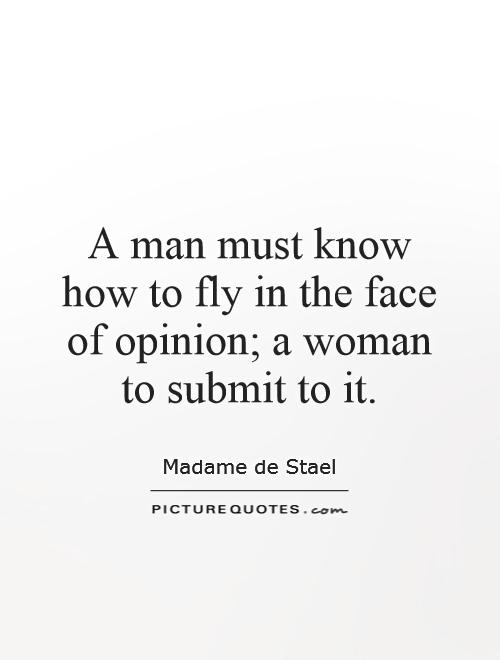A man must know how to fly in the face of opinion; a woman to submit to it

A man must know how to fly in the face of opinion; a woman to submit to it
In the context of Madame de Stael, a prominent French writer and intellectual of the 18th and 19th centuries, the quote "A man must know how to fly in the face of opinion; a woman to submit to it" takes on a particularly poignant meaning. Stael was a woman who defied societal norms and expectations, challenging the status quo and advocating for women's rights and intellectual freedom. She was known for her outspokenness and independence, often clashing with the prevailing opinions of her time.As a woman in a male-dominated society, Stael faced significant obstacles and criticism for her beliefs and actions. She was constantly at odds with the conservative values and attitudes of her contemporaries, who believed that women should be submissive and obedient. However, Stael refused to conform to these expectations, instead choosing to assert her own opinions and assert her independence.
Stael's life and work exemplify the idea that women must often submit to societal expectations and norms in order to navigate a world that is inherently biased against them. Despite her intelligence, talent, and ambition, Stael was frequently marginalized and dismissed because of her gender. She was forced to navigate a complex web of social constraints and expectations, constantly balancing her desire for self-expression with the need to conform to societal norms.
On the other hand, the quote also speaks to the idea that men have more freedom to challenge and defy societal expectations. Men are often encouraged to be assertive, ambitious, and independent, while women are expected to be passive, nurturing, and submissive. This double standard is evident in Stael's own life, as she struggled to assert her independence and assert her own opinions in a world that was hostile to women who dared to challenge the status quo.












 Friendship Quotes
Friendship Quotes Love Quotes
Love Quotes Life Quotes
Life Quotes Funny Quotes
Funny Quotes Motivational Quotes
Motivational Quotes Inspirational Quotes
Inspirational Quotes